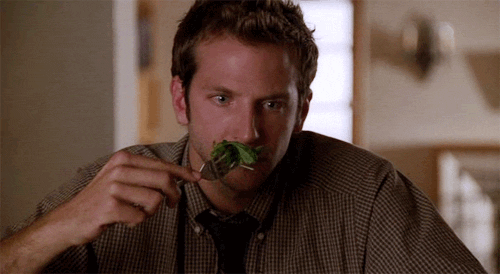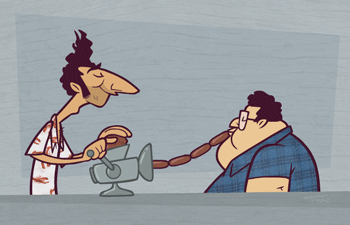
9 Things You Can Do To Reduce Your Cancer Risk
Cancer isn’t one disease — it’s a catch-all term for more than 100 different diseases, all characterized by unregulated cell growth.
Cells have many safeguards to grow in a controlled way, but things still can go wrong. And as long as cells are dividing in the body, there will always be the potential for cancerous cells to develop.
There are many factors that contribute to one’s risk of developing cancer, including genetics, environment, and lifestyle. There isn’t much a person can do about their genes, but there are definitely choices we can all make to help keep our cells safe.
Here are 9 super-simple ways to reduce your risk of cancer:
1. Avoid cigarettes.

This sounds a bit obvious, but quitting smoking and avoiding secondhand smoke doesn’t just reduce the risk of developing lung cancer. It also helps keep away mouth, throat, esophageal, liver, and a wide variety of other cancers.
In an effort to protect non-smokers from these cancerous effects, 23 states have already banned all tobacco use from workplaces, bars, and restaurants, with many others having some form of restriction. Legislators in states that are not yet at 100 percent bans should be urged to pass similar measures.
2. Get vaccinated.

Human papillomavirus (HPV) is an incredibly common STD that can lead to cervical, vaginal, penile, throat, or anal cancers.
Fortunately, there is a vaccine to prevent common forms of HPV that is recommended for children as young as 10. Overall, the vaccine has been shown to be incredibly effective and safe.
Additionally, keeping up on other vaccines is the best thing a person can do to ward off diseases, helping to keep their immune system healthy enough to fight off cancerous cells.
3. Eat more veggies.
 In order to give the body all the tools it needs to prevent the growth of cancerous cells, proper nutrition is a must. The best way to get this is through eating nutrient-dense foods, like broccoli, kale, cabbage, and other cruciferous vegetables.
In order to give the body all the tools it needs to prevent the growth of cancerous cells, proper nutrition is a must. The best way to get this is through eating nutrient-dense foods, like broccoli, kale, cabbage, and other cruciferous vegetables.
Not only do these veggies contain a lot of fiber to keep the digestive tract healthy and key vitamins and minerals, but they also contain glucosinolates, which are compounds believed to help prevent cancer by giving cells a hand in staying healthy.
4. Limit red meat and processed meats.

It was almost possible to hear millions of hearts breaking simultaneously when the World Health Organization confirmed that eating processed meats like hot dogs, bacon, and sausage directly cause colorectal cancer.
Red meat in general is believed to be harsh on the lining of the gut, causing the body to quickly replicate cells in order to manage the damage. Because the opportunity for harmful DNA mutations to occur is present every time cells divide, having to ramp up the process just increases the odds that cancer-causing mutations will happen.
The problem with processed meats is that on top of their red meat ingredients,nitrates are used to cure and preserve them. These nitrates greatly exacerbate the compounds that damage the gut.
On top of everything else, these meats are also subjected to cooking methodsknown to be carcinogenic, such as charring and frying.
5. Be mindful of alcohol consumption.

While there’s nothing wrong with hitting up happy hour every now and then,drinking to excess is linked with a number of cancers, including those in the head and neck, esophageal, breast, liver, and colorectal.
Damage from alcohol comes when the body tries to break it down. Acetaldehyde is an intermediary product that is formed that is toxic to the body. The damage can be recognized the morning after in the form of a hangover, but over time, the damage to the cells can increase the odds of developing cancer. Alcohol also makes it difficult for the body to metabolize key nutrients it needs to stay healthy.
As a double whammy, research has shown that people who use alcohol and tobacco together have a greater risk of developing cancer than the sum of their individual risks. Some genetic variants also make the effect worse than others.
6. Maintain a healthy weight.

How much a person weighs or the size of their pants has nothing to do with what a wonderful, beautiful person they are.
A person’s weight does, however, play into their risk of developing esophageal, breast, kidney, pancreatic, uterine, and colorectal cancers. How the fat is dispersed around the body also affects the risk. The greater amount of belly fat, the greater risk of colorectal cancer.
On top of reducing cancer risk, maintaining a healthy body weight also makes it more likely that a person will survive cancer, should they be diagnosed.
7. Protect yourself from the sun.

While sun exposure is important for getting vitamin D, the UV rays can cause skin cancer. Some skin cancers can be treated simply by cutting off the growth, while others can quickly spread through the skin — the body’s biggest organ. Skin cancer most commonly appear on the face, scalp, and ears.
Protect yourself by properly applying sunscreen every day and wearing a brimmed hat to block the sun’s rays. Avoid tanning beds, and make sure to monitor moles on your skin for changes in symmetry, size, and color.
8. Stay physically active.

Physical activity, paired with proper nutrition, is one of the most important things a person can do for their health.
Society is becoming increasingly sedentary, which increases the risk of developing lung, breast, colorectal, and endometrial cancers. Making time for exercise is a great way to lower the risks of these diseases while improving overall physical and mental well-being.
Curiously, the exact mechanism by which physical activity prevents cancer isn’t well-understood, but it appears to be related to the hormonal changes that occur in our bodies during physical activity.
9. Reduce stress.

Stress is what invokes the body’s fight or flight response, giving a little extra oompf for short-term, intense activity. If the stressed lasts for a long time, however, that buildup of hormones can have negative effects on the body.
Not only is the immune system become weakened over time by stress, but people who are stressed are more likely to engage in behaviors that increase the risk of developing cancer, including smoking, drinking, or overeating.
Manage stress with healthy habits, such as meditation, exercise, and therapy.
While it might not be realistic for every person to go to the extreme for each of these in order to try to avoid cancer, it’s important to remember that moderation is the key.
More than 8 million people die each year from some kind of cancer. Please help raise awareness for #WorldCancerDay by sharing this advice with your friends and loved ones.














